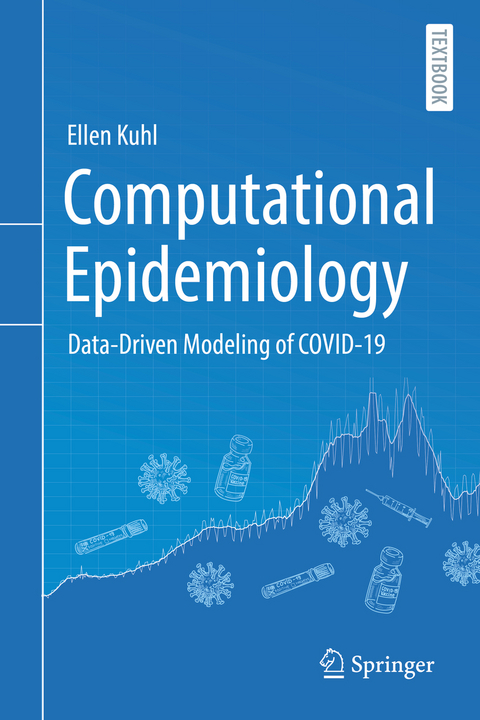
Computational Epidemiology
Springer International Publishing (Verlag)
978-3-030-82889-9 (ISBN)
This innovative textbook brings together modern concepts in mathematical epidemiology, computational modeling, physics-based simulation, data science, and machine learning to understand one of the most significant problems of our current time, the outbreak dynamics and outbreak control of COVID-19. It teaches the relevant tools to model and simulate nonlinear dynamic systems in view of a global pandemic that is acutely relevant to human health.
If you are a student, educator, basic scientist, or medical researcher in the natural or social sciences, or someone passionate about big data and human health: This book is for you! It serves as a textbook for undergraduates and graduate students, and a monograph for researchers and scientists. It can be used in the mathematical life sciences suitable for courses in applied mathematics, biomedical engineering, biostatistics, computer science, data science, epidemiology, health sciences, machine learning, mathematical biology, numerical methods, and probabilistic programming. This book is a personal reflection on the role of data-driven modeling during the COVID-19 pandemic, motivated by the curiosity to understand it.
lt;p>Ellen Kuhl is the Walter B. Reinhold Professor in the School of Engineering and Robert Bosch Chair of Mechanical Engineering at Stanford University. She is a Professor of Mechanical Engineering and, by courtesy, Bioengineering. She received her PhD from the University of Stuttgart in 2000 and her Habilitation from the University of Kaiserslautern in 2004. Her area of expertise is Living Matter Physics, the design of theoretical and computational models to simulate and predict the behavior of living systems. Ellen has published more than 200 peer-reviewed journal articles and edited two books; she is an active reviewer for more than 20 journals at the interface of engineering and medicine and an editorial board member of seven international journals in her field. She is a founding member of the Living Heart Project, a translational research initiative to revolutionize cardiovascular science through realistic simulation with 400 participants from research, industry, and medicine from 24 countries. Ellen is the current Chair of the US National Committee on Biomechanics and a Member-Elect of the World Council of Biomechanics. She is a Fellow of the American Society of Mechanical Engineers and of the American Institute for Mechanical and Biological Engineering. She received the National Science Foundation Career Award in 2010, was selected as Midwest Mechanics Seminar Speaker in 2014,
and received the Humboldt Research Award in 2016 and the ASME Ted Belytschko Applied Mechanics Award in 2021. Ellen is an All American triathlete on the Wattie Ink. Elite Team, a multiple Boston, Chicago, and New York marathon runner, and a Kona Ironman World Championship finisher.table of contents.- introduction.- infectious diseases.- a brief history of infectious diseases.- II. mathematical epidemiology.- introduction to compartment modeling.- compartment modeling of epidemiology.- concepts of endemic disease modeling.- data-driven modeling in epidemiology. - compartment modeling of COVID19.- early outbreak dynamics of COVID-19.- asymptomatic transmission of COVID-19.- inferring outbreak dynamics of COVID-19.- modeling outbreak control.- managing infectious diseases.- change-point modeling of COVID-19.- dynamic compartment modeling of COVID-19.- network modeling of epidemiology.- network modeling of epidemic processes.- network modeling of COVID-19.- dynamic network modeling of COVID-19.- informing political decision making through modeling.- exit strategies from lockdown.- vaccination strategies.- the second wave.- lessons learned.
"Right off the bat, let me say that I really enjoyed Kuhl's book. It is beautifully written, very engaging, and the topics and examples are thoughtfully chosen. ... This is a timely and truly wonderful book." (Anita T. Layton, SIAM Review, Vol. 64 (3), September, 2022)
"This is a very ambitious book. ... Every chapter has a collection of very good problems. ... the many examples using real data make the book a valuable resource. Overall the book presents a number of important ideas and offers some significant new approaches for modeling real and complicated epidemics. It's a great place to begin to understand where mathematical epidemiology is now and where it has to go." (Bill Satzer, MAA Reviews, May 9, 2022)
| Erscheinungsdatum | 24.09.2021 |
|---|---|
| Zusatzinfo | XVI, 312 p. |
| Verlagsort | Cham |
| Sprache | englisch |
| Maße | 155 x 235 mm |
| Gewicht | 649 g |
| Themenwelt | Medizin / Pharmazie ► Physiotherapie / Ergotherapie ► Orthopädie |
| Technik | |
| Schlagworte | asymptomatic transmission COVID-19 • change-point modeling COVID-19 • compartment modeling COVID19 • Data-driven modeling coronavirus • Data-driven modeling covid • dynamic compartment modeling COVID-19 • early outbreak dynamics COVID-19 • epidemiology coronavirus • epidemiology covid • Machine learning coronavirus • Machine learning covid • mathematical biology coronavirus • mathematical biology covid • network modeling COVID-19 • network modeling epidemic • outbreak dynamics COVID-19 • vaccination strategies covid |
| ISBN-10 | 3-030-82889-1 / 3030828891 |
| ISBN-13 | 978-3-030-82889-9 / 9783030828899 |
| Zustand | Neuware |
| Haben Sie eine Frage zum Produkt? |
aus dem Bereich


